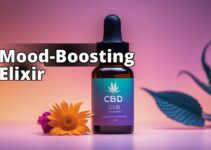What you will learn from this article:
- The symptoms, causes, and prevalence of depression.
- How CBD interacts with the endocannabinoid system to potentially alleviate symptoms of depression.
- The potential benefits of CBD oil for depression, including mood regulation, anxiety relief, improved sleep quality, and potential reduction in addictive behaviors.
In recent years, CBD oil has gained significant attention in the health and wellness industry for its potential benefits in treating various conditions, including depression. As more people seek natural alternatives to traditional medications, CBD oil has emerged as a promising option for managing symptoms of depression. This comprehensive guide aims to explore the potential benefits of CBD oil for depression, shedding light on its effects, safety considerations, and usage guidelines.
Depression is a common mental health condition that affects millions of people worldwide. It is characterized by persistent feelings of sadness, loss of interest or pleasure in activities, and a range of physical and cognitive symptoms. While traditional treatments for depression, such as antidepressant medications and therapy, have proven effective for many individuals, some people are looking for alternative approaches that may offer additional benefits.
Understanding Depression
Before delving into the potential benefits of CBD oil for depression, it is crucial to have a solid understanding of this mental health condition. Depression is more than just feeling sad or down; it is a complex disorder with a range of symptoms and underlying causes.
Depression symptoms can vary from person to person but often include persistent feelings of sadness, loss of interest or pleasure in activities, changes in appetite and weight, sleep disturbances, fatigue, difficulty concentrating, and thoughts of self-harm or suicide. These symptoms can significantly impact a person's quality of life and daily functioning.
The exact causes of depression are not fully understood, but it is believed to result from a combination of genetic, biological, environmental, and psychological factors. Imbalances in brain chemicals, such as serotonin, norepinephrine, and dopamine, are thought to play a role in the development of depression.
Traditional treatment options for depression typically involve a combination of antidepressant medications and psychotherapy. Antidepressants work by balancing brain chemicals and relieving symptoms of depression. Therapy, such as cognitive-behavioral therapy (CBT), helps individuals identify and change negative thought patterns and behaviors associated with depression.
Exploring CBD and its Effects on Depression
CBD, short for cannabidiol, is one of the many cannabinoids found in cannabis plants. Unlike its cousin THC (tetrahydrocannabinol), CBD does not produce psychoactive effects or the feeling of being “high.” Instead, it is believed to have various therapeutic properties, including potential benefits for mental health conditions like depression.
CBD interacts with the endocannabinoid system (ECS) in the body, which plays a crucial role in regulating mood, stress response, sleep, and other physiological processes. The ECS consists of cannabinoid receptors, endocannabinoids produced by the body, and enzymes that break down these compounds.
Research suggests that CBD may influence serotonin receptors in the brain. Serotonin is a neurotransmitter that helps regulate mood and emotions. Low levels of serotonin have been linked to depression and anxiety disorders. By interacting with serotonin receptors, CBD may potentially alleviate symptoms of depression and improve overall mood.
Limited research also suggests that CBD may have benefits for anxiety, cognitive impairment, and discomfort before public speaking. These findings further support the potential of CBD as a natural alternative for managing symptoms of depression.
It's important to note that the research on CBD and depression is still in its early stages, and more studies are needed to fully understand its effects and mechanisms of action. However, the existing evidence is promising and warrants further exploration.
To learn more about the potential benefits of CBD for depression, let's dive deeper into its specific effects.
The Potential Benefits of CBD Oil for Depression
CBD oil has been the focus of numerous studies investigating its effects on depression symptoms. While research is still ongoing, the preliminary findings suggest several potential benefits of CBD oil for individuals with depression.
Mood Regulation and Reduction of Depressive Symptoms
One of the primary potential benefits of CBD oil for depression is its ability to regulate mood and reduce depressive symptoms. CBD may interact with brain receptors involved in mood regulation, such as serotonin receptors, and promote a sense of well-being.
A study published in the Journal of Clinical Psychology explored the use of CBD for self-treatment of depression [source]. The study found that the majority of respondents reported feeling better after using CBD and preferred it over prescription drugs. However, it's important to note that this study had limitations in sample size and methodology, highlighting the need for further research on the safety and efficacy of CBD for mental disorders.
Anxiety Relief and Stress Management
Anxiety often coexists with depression, and many individuals with depression experience symptoms of anxiety as well. CBD oil may offer relief for both conditions, as it has been shown to have potential anti-anxiety effects.
CBD interacts with receptors in the brain involved in the regulation of anxiety, such as the CB1 receptor. By modulating these receptors, CBD may help reduce feelings of anxiety and promote a sense of calmness. This can be particularly beneficial for individuals with depression who experience heightened anxiety symptoms.
Improved Sleep Quality and Relaxation
Sleep disturbances are a common symptom of depression, with many individuals experiencing insomnia or disrupted sleep patterns. CBD oil may offer potential benefits for improving sleep quality and promoting relaxation.
Studies have suggested that CBD may have a positive impact on sleep by reducing anxiety, promoting feelings of relaxation, and potentially regulating sleep-wake cycles. By addressing sleep disturbances, CBD oil may contribute to an overall improvement in depressive symptoms.
Potential Reduction in Addictive Behaviors
Problematic cannabis use, including high levels of THC consumption, can exacerbate symptoms of depression and increase the risk of addiction. CBD oil, on the other hand, may offer a potential alternative for individuals looking to reduce addictive behaviors associated with cannabis use.
A study published in the Journal of Substance Abuse Treatment examined the use of CBD in reducing problematic cannabis use [source]. The study found that CBD reduced cannabis cravings and withdrawal symptoms, suggesting its potential role in addressing addictive behaviors. However, further research is needed in this area to fully understand the effects of CBD oil on addictive behaviors.
These potential benefits of CBD oil for depression highlight its promising role as a natural alternative to traditional treatments. However, it's important to note that CBD oil should not replace prescribed medications or therapy without consulting a healthcare provider.
CBD Oil vs. Traditional Treatment for Depression
While CBD oil shows promise for managing symptoms of depression, it's essential to compare it with traditional treatment options to understand its potential advantages and limitations.
Comparison with Antidepressant Medications
Antidepressant medications, such as selective serotonin reuptake inhibitors (SSRIs) and serotonin-norepinephrine reuptake inhibitors (SNRIs), are commonly prescribed for depression. These medications work by increasing the availability of certain neurotransmitters in the brain, such as serotonin.
Compared to antidepressant medications, CBD oil may offer some potential advantages. For instance, CBD oil may have a faster onset of action, with some individuals reporting immediate relief of symptoms after use. Additionally, CBD oil is generally well-tolerated and may have fewer side effects compared to antidepressants, which can cause various adverse effects.
However, it's crucial to note that CBD oil is not a substitute for prescribed medications, and individuals should always consult with their healthcare provider before making any changes to their treatment plan.
Importance of Consulting Healthcare Providers
When considering CBD oil as a potential treatment for depression, it is crucial to consult with a healthcare provider. They can provide personalized guidance based on an individual's specific needs, medical history, and current medications.
CBD may interact with certain medications, including antidepressants, blood thinners, and anticonvulsants. Therefore, it's important to discuss CBD use with a healthcare provider to ensure it is safe and does not interfere with other treatments.
Additionally, healthcare providers can offer valuable insights into dosage recommendations, potential side effects, and the overall suitability of CBD oil for an individual's unique circumstances.
Choosing and Using CBD Oil for Depression
If you and your healthcare provider have decided that CBD oil may be a suitable option for managing depression symptoms, it's important to make informed choices when purchasing and using CBD oil.
Guide to Purchasing CBD Oil
When purchasing CBD oil, it is crucial to buy from reputable sellers to ensure product quality and safety. Reputable sellers provide third-party lab testing results to verify the potency and purity of their products. These lab reports confirm that the CBD oil does not contain harmful contaminants, such as pesticides, heavy metals, or residual solvents.
To find reputable CBD sellers, you can search online for customer reviews and ratings, look for certifications or seals of quality, and consider recommendations from trusted sources.
Different Forms of CBD Products and Administration Methods
CBD oil is available in various forms, including oils, tinctures, capsules, topicals, and edibles. Each form has its own advantages and considerations, so it's important to choose the one that suits your preferences and needs.
Oils and tinctures are popular options for sublingual administration, where the CBD oil is placed under the tongue and absorbed through the mucous membranes. This method allows for faster absorption and may result in quicker onset of effects.
Capsules and edibles offer a convenient way to incorporate CBD oil into your daily routine, but they may have a slower onset of action due to the digestion process.
Topical CBD products, such as creams and lotions, are designed for localized application and may be beneficial for managing pain or inflammation associated with depression.
Dosage Recommendations and Starting Points
Determining the optimal CBD dosage for depression can be challenging, as individual needs can vary. It's recommended to start with a low dosage and gradually increase it until the desired effects are achieved.
It's important to note that there is no standardized dosage for CBD oil, as factors such as body weight, metabolism, and the severity of symptoms can influence the appropriate dosage. Consulting with a healthcare provider can provide valuable guidance on finding the right dosage for your specific needs.
Case Study: Sarah's Journey with CBD Oil for Depression
Sarah, a 32-year-old marketing executive, had been struggling with depression for several years. Despite trying various traditional treatment options, including therapy and antidepressant medications, she still experienced persistent symptoms that affected her daily life and overall well-being.
One day, Sarah came across an article discussing the potential benefits of CBD oil for depression. Intrigued, she decided to do some research and consult with her healthcare provider before incorporating CBD oil into her treatment plan.
After discussing her options with her doctor, Sarah decided to give CBD oil a try. She purchased a high-quality CBD oil from a reputable seller and followed the recommended dosage instructions. Within a few weeks of consistent use, Sarah began to notice some positive changes in her mood and overall mental well-being.
She found that CBD oil helped regulate her mood and reduce the severity of her depressive symptoms. Additionally, Sarah experienced a significant reduction in anxiety and felt more relaxed and calm throughout the day. She also noticed an improvement in her sleep quality, which had been disrupted by insomnia for years.
With continued use of CBD oil, Sarah found that her addictive behaviors, such as excessive alcohol consumption, decreased significantly. She felt more in control of her impulses and had a greater ability to make healthier choices in her life.
Sarah's experience with CBD oil for depression has been a transformative journey. While she still incorporates other self-care practices and therapy into her treatment plan, CBD oil has become an essential tool in managing her mental health. She encourages others with depression to explore CBD oil as a potential self-treatment option while consulting with healthcare providers for guidance tailored to their individual needs.
Safety Considerations, Legalities, and Potential Side Effects
While CBD oil is generally well-tolerated by most individuals, it's essential to consider safety precautions, legalities, and potential side effects.
Importance of Talking to Healthcare Providers
Before incorporating CBD oil into a treatment plan for depression, it's important to have an open and honest conversation with your healthcare provider. This is especially crucial for individuals with underlying health conditions or those taking medications that may interact with CBD.
Healthcare providers can provide personalized advice, assess potential risks, and help monitor your progress to ensure the safe and effective use of CBD oil.
Federal Legality and State Laws
CBD products derived from hemp plants with less than 0.3% THC are federally legal in the United States. However, it's important to note that state laws regarding CBD may vary, and it's essential to check the specific regulations in your state.
Nonprescription CBD products are not approved by the FDA, which means they have not undergone the same rigorous testing and scrutiny as prescription medications. It's important to be aware of this and make informed decisions when choosing CBD oil products.
Potential Side Effects of CBD Oil Use for Depression
While CBD oil is generally well-tolerated, some individuals may experience side effects. These side effects are typically mild and may include fatigue, dry mouth, changes in appetite, and diarrhea.
If you experience any adverse effects after using CBD oil, it's recommended to reduce the dosage or discontinue use and consult with a healthcare provider if the symptoms persist or worsen.
Conclusion
In conclusion, CBD oil offers potential benefits for individuals with depression, providing a natural alternative to traditional treatment options. While research is still ongoing, early studies suggest that CBD may help regulate mood, reduce anxiety, improve sleep quality, and potentially address addictive behaviors associated with cannabis use.
However, it's important to approach CBD oil as a complementary treatment and consult with a healthcare provider before incorporating it into your depression management plan. Healthcare providers can offer personalized guidance, ensure safety, and monitor your progress.
As the potential benefits of CBD oil for depression continue to be explored, it is crucial to conduct further research to better
Q & A
What are the benefits of CBD oil for depression?
CBD oil can help reduce anxiety, improve mood, and promote relaxation.
Who can benefit from using CBD oil for depression?
Anyone experiencing symptoms of depression can potentially benefit from CBD oil.
How does CBD oil work to alleviate depression symptoms?
CBD oil interacts with the body's endocannabinoid system, regulating mood and emotions.
What is the recommended dosage of CBD oil for depression?
Dosage varies, but starting with a low dose and gradually increasing is recommended.
How long does it take to see results from using CBD oil for depression?
Results may vary, but some individuals report improvements within a few weeks.
But isn't CBD oil just a placebo for depression?
CBD oil has shown promising results in studies and anecdotal evidence, suggesting it is not just a placebo.
William is a renowned expert in the field of mental health and has dedicated years of research to understanding the impact of natural remedies on mental health conditions. With a PhD in Psychology from a prestigious university, William has conducted extensive studies on the effects of CBD oil on depression.
Throughout William's career, they have published numerous peer-reviewed articles in reputable journals, shedding light on the potential benefits of CBD oil for depression. Their research has been well-received by the scientific community and has been cited by other experts in the field.
William is also a licensed therapist with over a decade of experience in helping individuals with mental health disorders. They have witnessed firsthand the struggles that people with depression face and have seen the positive impact that CBD oil can have on their well-being.
With their vast knowledge and expertise, William aims to provide readers with an in-depth understanding of CBD oil benefits for depression. They believe in the importance of evidence-based information and emphasize the significance of consulting healthcare providers before incorporating CBD oil into one's treatment plan.




